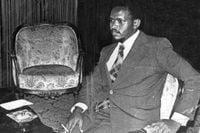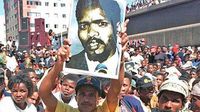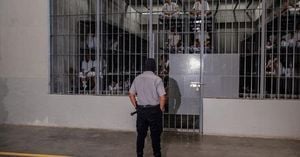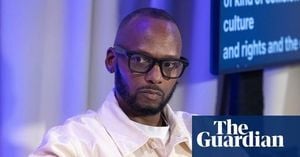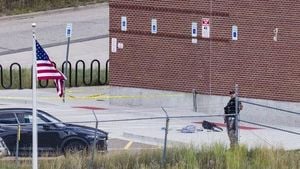Nearly half a century after the death of Steve Biko, the South African anti-apartheid hero whose name became synonymous with the struggle for Black liberation, a new inquest has been opened into the circumstances surrounding his killing. On September 12, 2025—the 48th anniversary of Biko’s death—South Africa’s High Court in Gqeberha convened the first hearing in a case that has haunted the nation for decades. The Biko family, long frustrated by the lack of accountability, expressed renewed hope that the reopening of the investigation would finally deliver justice for one of the most painful chapters in the country’s history.
Steve Biko, a charismatic leader and founder of the Black Consciousness Movement, died at just 30 years old after being detained by apartheid police in 1977. According to BBC News, he was arrested at a roadblock in what was then Grahamstown (now Makhanda) for allegedly violating a “banning order”—a draconian measure that restricted his movements and silenced his activism. For 20 days, Biko was held naked and shackled in jail, then driven more than 600 miles to Pretoria, still naked and with his legs in chains, before dying in custody the day after his arrival.
The official explanation at the time was that Biko had banged his head against a wall during an altercation, or, as some reports claimed, died after a hunger strike. But as apartheid crumbled in the 1990s and the Truth and Reconciliation Commission (TRC) began its work, former police officers admitted to assaulting Biko while in detention. Despite these admissions—and the TRC’s recommendation for more than 300 apartheid-era prosecutions—no one has ever been held criminally responsible for Biko’s death.
Nkosinathi Biko, Steve’s son, was just six years old when his father died. He told the BBC, “It’s very clear in our minds as to what happened and how they killed Steve Biko.” After the first hearing in Gqeberha, he added, “What is required from this process is simply to follow the facts, and we have no doubt that a democratic court, in a democratic state, will find that Steve Biko’s murder was an act, orchestrated and executed by those who were with him—the five policemen who are implicated in this case.”
The harrowing details of Biko’s final days have been corroborated by family members and eyewitnesses who saw his body after death. As reported by UPI, Nkosinathi Biko recounted in a recent interview, “My dad was a very healthy man, and we know he died of a severe brain hemorrhage. During the TRC process it was clear under intense cross-examination that one of the men admitted that they grabbed his head and rammed it into the wall which caused his death. They were denied amnesty at the TRC because, of course, they lied.” The cause of death was recorded as extensive brain injury and acute kidney failure—consistent with brutal torture and neglect.
The first inquest into Biko’s death, held during the apartheid era, accepted the police version of events. However, the TRC hearings decades later revealed that five police officers had colluded and submitted false affidavits to cover up the true cause of death. Under cross-examination, they admitted their deception, but legal accountability remained elusive. According to BBC News, two individuals linked to the case are still alive, both now in their 80s.
The opening of the new inquest comes five months after President Cyril Ramaphosa ordered a judicial inquiry into allegations that previous governments had deliberately blocked investigations and prosecutions of apartheid-era crimes. The National Prosecuting Authority, represented by spokesperson Luxolo Tyali, described the inquiry as “an effort to address the atrocities of the past and try to give closure to the Biko family and society at large.”
Steve Biko’s legacy looms large in South Africa’s collective memory. As a medical student at the University of Natal, he founded the Black Consciousness Movement—a political and philosophical project aimed at empowering Black South Africans and combating the psychological scars left by white-minority rule. At a time when other anti-apartheid leaders like Nelson Mandela had been silenced or imprisoned, Biko’s voice rallied a new generation of activists. His death in 1977 sparked outrage both at home and abroad, inspiring the 1987 film Cry Freedom and immortalized in Peter Gabriel’s song “Biko” and Beenie Man’s “Steve Biko.”
Yet, as Nkosinathi Biko pointed out, South Africa’s journey toward justice has been anything but straightforward. “Accountability for our violent, brutal past is something that has evaded South African society,” he told the BBC. “You cannot have the trauma that we had, the flow of blood in the streets orchestrated by a state against a people, and then you emerge with less than a handful of prosecutions ever being successfully made.” He emphasized that families disappointed by the lack of prosecutions recommended by the TRC have continued to push for justice, adding, “You can’t give root to a democracy without dealing with some of the historical issues decisively.”
For many South Africans, the Biko case is emblematic of a broader struggle to reckon with the crimes of apartheid. The TRC, established in 1996 under the leadership of Archbishop Desmond Tutu, uncovered countless atrocities—murders, torture, and other gross human rights violations. Yet, as UPI notes, few cases ever progressed to trial, and the sense of unfinished business has bred frustration and anger among victims’ families and the wider public.
The current inquest represents a rare opportunity to revisit the facts, confront the legacy of impunity, and, perhaps, set a new precedent for accountability. As of the first hearing, the judge heard testimony about the surviving suspects and the events leading to Biko’s death. The case has been adjourned until November 12, 2025, giving investigators and prosecutors more time to gather evidence and build a case that could, at long last, bring those responsible to justice.
Steve Biko’s story is not just a tale of one man’s courage and martyrdom; it is a mirror held up to a nation still grappling with its past. Whether the new inquest will finally deliver the justice that has eluded South Africa for nearly fifty years remains to be seen, but for the Biko family and many others, hope endures that truth—and accountability—will prevail.
